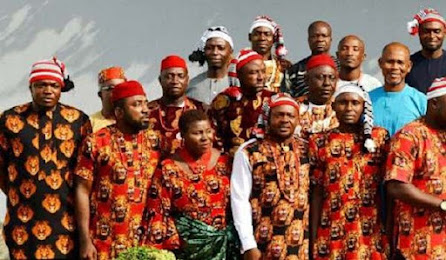Challenging The Historical Misrepresentation And Dangerously Distorted Narratives Against Igbo History serves as a lens through which we vie...
Challenging The Historical Misrepresentation And Dangerously Distorted Narratives Against Igbo
History serves as a lens through which we view the past. It is crucial that it shouldn't be tainted by prejudice or misinformation. This very standard is bent on a book recently published and approved by Nigerian Ministry of Education. The book titled "FUNDAMENTALS OF CIVIC EDUCATION," intended for JSS 2 students. In page 38 of this book, the author, Sola Akinyemi maliciously distorted history, alleging that the Igbo people were responsible for the invasion and capture of people from other region as slaves.
As we know that education is a powerful tool that shapes the beliefs, perceptions, and values of generations to come. Therefore, the content of educational materials, particularly history books, holds significant influence over the minds of young learners. In this context, the controversy surrounding the "FUNDAMENTALS OF CIVIC EDUCATION" book highlights the need for responsible and truthful historical education
One of the fundamental principles of education is to provide accurate and unbiased information. Historical events, especially those as sensitive as the transatlantic slave trade, must be presented with precision and fairness. Inaccurate depictions can lead to the perpetuation of stereotypes, the distortion of facts, and the demonization of entire communities.
Misrepresenting historical facts can have far-reaching consequences. In the case of the lie in question, it not only misrepresents the Igbo people but also contributes to stigmatization and division among ethnic groups. This situation can lead to heightened tensions and conflicts if left unaddressed.
To understand the fallacy in blaming the Igbo for slave raids, we must delve into the historical context of the transatlantic slave trade in Africa. It is essential to recognize that the slave trade was a complex and multifaceted phenomenon involving various African societies, European powers, and other players. Several factors, not exclusive to any single group contributed to the capture and enslavement of Africans.
African Kingdoms and Empires:
a. Asante, Benin, Dahomey, and Oyo Empires were powerful and influential entities in West Africa.
b. These empires engaged in their slave raids and trading, often capturing people from neighboring regions.
c. The competition for power and resources among these empires fueled the demand for slaves.
Trans-Saharan Slave Trade:
a. North of the Oyo Empire, the Trans-Saharan slave trade was flourishing.
b. This trade route connected North Africa to sub-Saharan Africa, with various ethnic groups involved in the capture and sale of slaves.
Igbo Society:
a. The Igbo people, primarily concentrated in southeastern Nigeria, have a unique societal structure.
b. They were not empire builders and did not fall under the hegemony of the aforementioned empires.
c. Igbo society was organized into decentralized communities, each with its own governance.
Blaming the Igbo people for slave raids is not only historically inaccurate but also unfair. Igbo society was not known for being involved in large-scale slave raids for profit. Instead, they had their own distinct social and economic systems. And it is also crucial to separate the actions of a few individuals from an entire ethnic group when discussing historical events.
Misrepresenting historical facts can have severe consequences. It perpetuates stereotypes, fosters division among communities, and reinforces bias. In the case of blaming the Igbo for slave raids, it unfairly stigmatizes an entire ethnic group, ignoring the broader historical context in which slavery thrived.
Scapegoating the Igbo for historical events has repercussions in modern times. It can strain inter-ethnic relations and hinder the efforts of reconciliation and unity. Instead of dwelling on divisive narratives, it is imperative to acknowledge the shared history of Africans during the slave trade and the resilience of these communities in the face of adversity.
Blaming a single ethnic group for this atrocity oversimplifies history and perpetuates stereotypes.
We must strive for accurate and unbiased historical narratives that promote understanding and unity among different communities. Rather than seeking to criminalize any particular group, we should recognize the shared history of suffering and resilience that defines the African experience during the era of slavery. By doing so, we can move towards a more inclusive and empathic understanding of our past and present.
Written by Obulose Chidiebere
Edited by Ogah C S Maduabuchi
For Family Writers Press International






No comments
Note: only a member of this blog may post a comment.